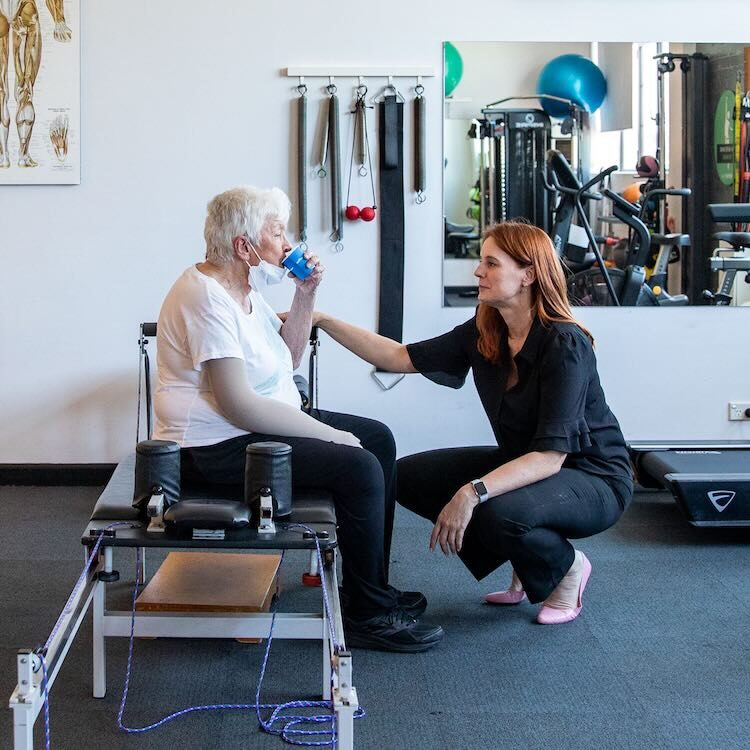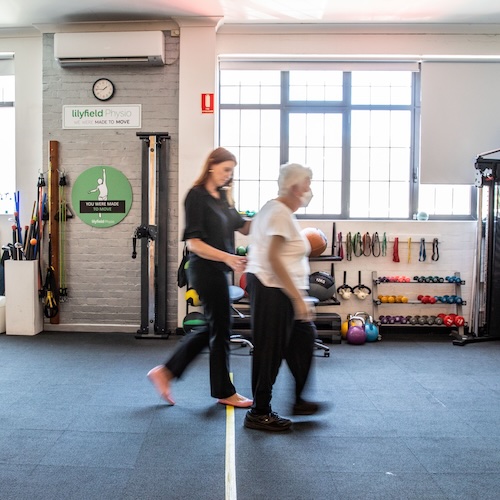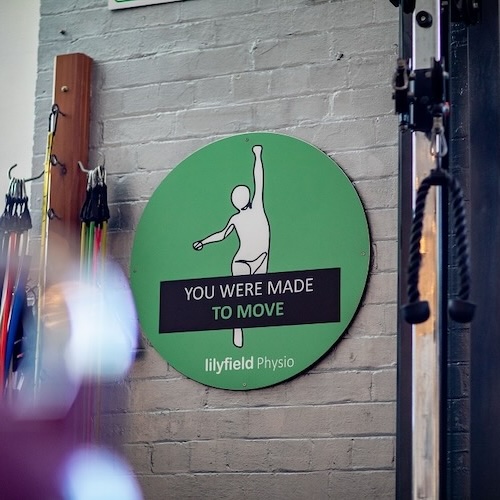Book a Physio for Incontinence in Sydney
Our incontinence physio in Sydney is delivered by our expert team—led by Karen Westcott and Kam Bhabra (Principal Physiotherapists), supported by Gurasees Bajwa and Niamh Davies (Physiotherapists), and Angel Nang (Accredited Exercise Physiologist).
Whether you’re recovering after childbirth, managing bladder leakage post-prostate surgery, or addressing overactive bladder symptoms, our tailored programs combine gentle hands-on care with structured pelvic floor retraining and education to help you move comfortably and confidently again.
You’ll find us at:
- Mon – Tue: 7:00 AM – 7:00 PM
- Wed: 7:00 AM – 7:30 PM
- Thu: 7:00 AM – 6:00 PM
- Fri: 7:00 AM – 4:00 PM
- Sat: 8:00 AM – 1:00 PM
- Sun: Closed

How We Treat Incontinence
Our physiotherapists provide personalised incontinence management programs to address both physical and behavioural factors affecting bladder and bowel control.
Treatment May Include
- Pelvic floor assessment
- Targeted pelvic floor strengthening and relaxation training
- Bladder retraining programs to improve timing, control and urge suppression
- Manual therapy for pelvic or lower back tension
- Education and self-management strategies on posture, lifting, and hydration
- Exercise physiology support for overall strength, stability and movement confidence
Initial Consultation: $160
Review Assessment and Consultation: $155
Standard Consultation: $125
Please note: A cancellation fee of $83 applies for cancellations within 24 hours of the scheduled appointment. Private health rebate applicable.
Types of Incontinence We Treat
- Symptoms: Leakage when coughing, sneezing, laughing, or exercising
- Common Causes: Pregnancy, childbirth, menopause, or pelvic surgery
- Physio Approach: Pelvic floor strengthening, breathing control, posture retraining
- Expected Recovery: Improvement within 6–8 weeks with continued practice
- Symptoms: Sudden urge to urinate, frequent bathroom trips, leakage before reaching the toilet
- Common Causes: Overactive bladder muscles or nerve sensitivity
- Physio Approach: Bladder retraining, relaxation, and pacing techniques
- Expected Recovery: Noticeable change within 8–12 weeks with consistent exercises
- Symptoms: Both stress and urge symptoms
- Physio Approach: Combined program of strengthening, bladder training, and behavioural modification
- Symptoms: Leakage or dribbling after prostate procedures
- Physio Approach: Male pelvic floor retraining, biofeedback, progressive load exercises, education on recovery timelines


Our Approach to Incontinence Physiotherapy
- Comprehensive Assessment: Pelvic health history, movement analysis, bladder and bowel habit review
- Individualised Exercise: Targeted pelvic floor and core strengthening tailored to your needs
- Manual Therapy: Hands-on treatment for pelvic or spinal tension
- Biofeedback & Ultrasound: Real-time visual feedback to support muscle retraining
- Education & Support: Practical advice on bladder habits, breathing, posture and lifting
- Progress Review: Regular follow-ups to track results and adapt your plan
What Causes Incontinence?
Common causes include:
- Pelvic floor muscle weakness or overactivity – often linked to muscle strain, poor activation, or over-tightening that disrupts normal bladder and bowel control.
- Pregnancy and childbirth – stretching or trauma to the pelvic floor during pregnancy, labour, or vaginal delivery can weaken the muscles that support continence.
- Hormonal changes during menopause – reduced oestrogen levels can affect pelvic tissue elasticity and muscle tone, increasing bladder sensitivity and urgency.
- Prostate surgery or radiation therapy – post-surgical changes can temporarily affect bladder control and pelvic floor coordination in men.
- Chronic coughing or heavy lifting – repeated abdominal pressure can overload the pelvic floor, leading to stress incontinence over time.
- Constipation or straining – frequent straining places excessive pressure on pelvic structures, weakening muscles and nerves involved in continence.
- Neurological conditions – such as multiple sclerosis, Parkinson’s disease, spinal injury, or stroke, which may interfere with the brain–bladder communication pathway.
- Obesity and reduced physical fitness – extra abdominal pressure and low muscle tone can contribute to bladder leakage.
- Pelvic surgery or trauma – scar tissue or nerve disruption can affect normal pelvic muscle activation and control.
- Poor toileting habits – frequent “just in case” visits or incomplete emptying can train the bladder into unhelpful patterns over time.

Ready to Regain Control and Confidence?
Incontinence can affect more than just your physical health — it can impact your confidence, social life, and daily comfort. With professional guidance and a structured physiotherapy plan, recovery is achievable.
Book your incontinence physio appointment with Lilyfield Physiotherapy today and take the first step toward feeling in control again.
Ongoing Rehab & Exercise Classes
In addition to one-on-one physiotherapy, Lilyfield Physio offers group rehab and exercise classes designed to support your long-term health. These classes focus on building strength, improving mobility, correcting movement patterns, and maintaining joint resilience.
With a wide range of class types and convenient times, there’s plenty of opportunity to continue progressing safely under expert guidance.
Meet Our Team
Lilyfield Physiotherapy is proud to offer some of Australia’s most experienced and highly qualified physiotherapists, committed to helping you move better, faster.
FAQs
It’s a specialised treatment focused on assessing and retraining the pelvic floor muscles to restore bladder and bowel control through exercise, education, and habit modification.
Yes. Pelvic floor physiotherapy is widely recognised as one of the most effective non-surgical treatments for urinary incontinence.
Anyone experiencing bladder leakage, urgency, or bowel control issues — including women post-childbirth, men post-prostate surgery, and older adults.
Absolutely. Our sessions are private and handled with the utmost professionalism and sensitivity.
Most people experience progress within 6–8 weeks of consistent practice and follow-up care.
If you have private health cover and subscribe to the “extras” cover, you may be eligible to claim part of your treatment fee. There are many different schemes and you are best advised to check your level of cover with your insurer. Most health funds are online with HICAPS, which allows you to claim your health fund rebate immediately at our clinic, leaving only the gap for you to pay. You will need to bring your health fund card with you.
Yes, in some cases. Medicare now offers chronic disease management referred to as Enhanced Primary Care (EPC) plans, for people with chronic conditions. This allows for a Medicare rebate, for up to 5 physio or exercise physiology treatments a year. You must be referred by your GP and you need to bring your Medicare card with you. If you have any queries regarding this service, please don’t hesitate to speak with our staff or discuss your eligibility with your GP.
Your physiotherapist will take a detailed history and may use external or (with your consent) internal assessment to evaluate pelvic muscle function.
You are welcome to wear whatever you are most comfortable in. For Exercise sessions and classes, please wear exercise clothes and a pair of socks, making sure you able to move freely
Please bring along any doctor’s referral letters, scan or x-ray results and your private health insurance card so you can claim for your treatment on the spot.
Your Physiotherapist will complete a thorough assessment of your complaint and then provide you with a preliminary diagnosis and appropriate treatments based on their findings. This will generally consist of some hands-on treatment, advice and often you will receive some exercises to do at home. Your Physiotherapist will also discuss with you their plan for management which will include likely recovery time, number of sessions required and future exercise advice.
We accept cash, EFTPOS, VISA and MasterCard. If you bring your private health insurance card with you, we can process an on-the-spot claim via our HICAPS terminal and you will then only need to pay the gap fee.
Yes. Physiotherapists can refer patients directly for MRI scans, provided they have completed the appropriate training and accreditation. Your physiotherapist will determine if an MRI is necessary based on your assessment and condition.
Yes. Physiotherapists can provide medical certificates (sick notes) for issues related to musculoskeletal or physical health concerns. These certificates can cover time off work, recommendations for modified duties, or clearance for returning to regular activities.
We accept referrals for Compulsory Third-Party Insurance claims. Once you have seen your GP and received a claim number, we are able to send any invoices directly to the insurer. If you need to start treatment before you have a claim number, we shall ask you to cover the cost of the treatment and claim from the insurer later.
You can cancel and re-schedule by calling our rooms on 9810 2203. For after hours, we have an answering machine service for you to leave a message. Our receptionist will contact you shortly after it is received to confirm cancellation or to help you re-schedule.
We request that if you are unable to make a consultation or class that you let us know at least 24 hours prior to your appointment so that someone else can use your treatment time.
We have a cancellation fee policy for late cancellations or missed appointments.
This practice takes great care to ensure that our information records are accurate and are treated with full regard to the privacy of our patients. We only collect information from our patients that is necessary for good health care and aim to ensure that any information we hold is accurate, complete and up-to-date.
The health information we hold helps us provide our patients with the best possible health care, and is disclosed only to others involved in your treatment, such as your doctor. If we need to disclose information about you to people other than those associated with your treatment, we will seek your permission first.
Occasionally we may be involved in research on health issues. If any data from this practice is used in research, it will not include information which identifies our patients.
This practice is bound by the Privacy Amendment (Private Sector) Act 2000, and operates in accordance with the Code of Conduct of the Australian Physiotherapy Association. If you would like to discuss any aspects of our privacy policy, or review your health records, please advise your treating Physiotherapist or Exercise Physiologist.











